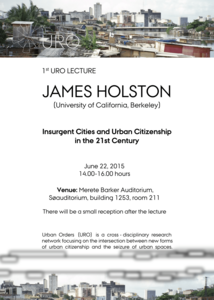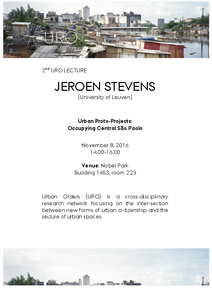URO organises yearly URO Lectures, where distinguished urbanists are invited to engage with the idea of ‘urban orders’ in relation to their own work. When possible, URO Lectures are followed by PhD seminars where PhD students get the unique opportunity to discuss their ongoing work with the invited guest.

Urban Orders' first URO Lecture was given by James Holston, University of California, Berkely on "Insurgent Cities and Urban Citizenship in the 21st Century" 22nd of June 2015.
Abstract
Insurrection inaugurated the 21st century with a series of metropolitan rebellions. Buenos Aires, Athens, Reykjavik, Tunis, Cairo, New York, Madrid, Phnom Penh, Istanbul, São Paulo, and countless other cities around the world presented distinctive forms of rebellion that rejected existing politics and stormed the state with alternatives. Many of these alternatives arose out of the insurgents’ own production of city life and were prefigured in their own processes of urban assembly and deliberation. This keynote address considers whether they constitute a new kind of insurgent urban citizenship, one that both enacts and asserts new forms of direct democracy. It does so by examining the intersection of city-making, city-occupying, and rights-claiming in which they emerge.

Urban Orders' second URO lecture was given by Belgian Jeroen Stevens, University of Leuven, on "Urban Proto-Projects: Occupying Central São Paolo", November 8th 2016.
Abstract
Central São Paulo is concurrently the site, subject and incessantly provisional product of myriad occupations. Over the course of the last decades, retreat left the central city in decay and dilapidation. Consequently, vacancy accrued. Simultaneously, social and cultural movements increasingly re-appropriated the aggregating depository of abandoned urban fabrics. Numerous decrepit constructions were occupied in such manner, and converted into transitional low-income dwellings, artistic laboratories or inventive collective spaces. Exploring the nexus of occupations and urbanism, this presentation will present a selective anthology of occupied spaces in downtown São Paulo as to inquire whether and how such practices perform latent urban ‘proto-projects’, that is, projects for a city ‘in the making’. The focus lies on the spatial articulation of occupations, exploring how they demonstrate radical claims for inclusive rights to the city, whilst starting building them with makeshift installations and temporary urban interventions. The hypothesis holds that such creative interventions, emerging from distinctive material deficiencies, prefigure latent alternative urban futures by piecing together real-scale prototypes of potential future scenarios. The work builds on ongoing extensive fieldwork in São Paulo, carried-out in close collaboration with occupation movements, human rights associations and local governmental institutions.